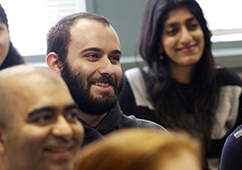Global Vision
Developing Relationships With International Institutions
The world is becoming increasingly globalized, and universities are a part of that trend. More graduates work in other countries and other cultures, more students study abroad, and more faculty seek out the best research collaborators across the globe. Many of these types of international relationships can be found on our Global Initiatives website.
The benefits to these global relationships include exposure to different environments or cultures and access to specialized equipment, facilities, and data. Many of the existing global opportunities have been the result of opportunistic interactions among faculty and departments. But this organic evolution may not fully prepare us for what will likely become an even fiercer international global competition for talented students and faculty.
Customized Engagement
McCormick recognizes various models of engagement at the undergraduate, graduate, and professional levels to increase global engagement. These models include having more international students and faculty coming to Northwestern; having McCormick faculty and students travel overseas; and working with new and emerging universities overseas to develop their educational systems and research enterprise.
Each group of McCormick constituents requires different needs. Undergraduate activities are driven by education; graduate activities are driven by research; and professional activities are driven by specific needs such as master’s degree or executive programs. For example, teaching may be portable, whereas research may not be (as it is often tied to expensive and extensive physical facilities).
Valuable Relationships and Global Reach
Governing international collaborations involves a multitude of details such as scheduling, health insurance, visas, and housing. But the most important aspect is consideration of the overall value proposition — the value provided to both McCormick and the international institution, the value provided to the participant, and the overall cost-benefit ratio.
When forming new relationships, McCormick considers the value of the program in enhancing the professional development of the participants, the reputation of the international institution, the quality of the students or researchers involved in the program, the quality of the educational or research experience for the participants, the impact on McCormick resources, the ability to attract top undergraduate and graduate students to programs, and the financial viability and self-sustainability of the program. All of these items are carefully and strategically considered when expanding McCormick’s global reach.


